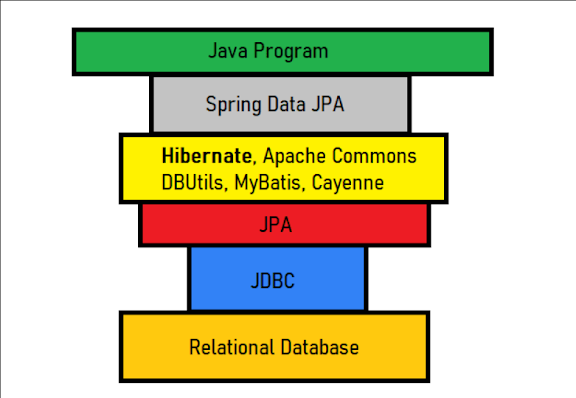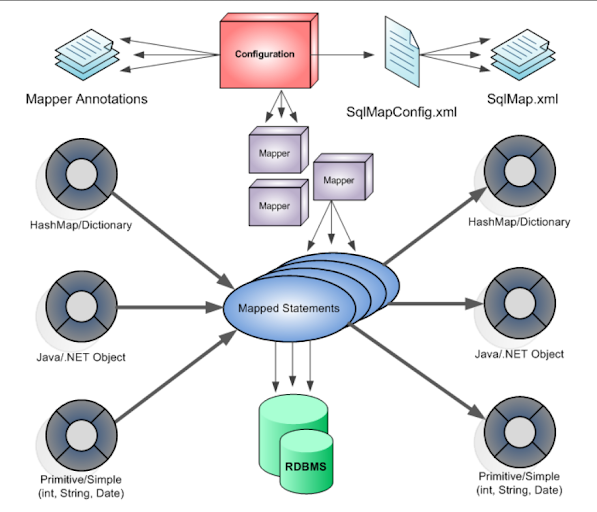Hello guys, if you are wondering what is difference between Hibernate, JPA, and MyBatis in Java world and when to use them then you have come to the right place. Earlier, I have shared Hibernate Courses, books, and Interview Questions and in this article, I will answer this popular Hibernate question from Java developer's perspective. This article aims to give a brief overview of Hibernate, JPA, and MyBatis. Moving ahead highlights the difference between them. It also put light on which underlying technologies they use. Lastly, it provides verdicts on when to use which one among these. But, before we start with the difference between JPA, Hibernate, and MyBatis. It is important to have an understanding of these technologies first.
JPA is java specifications that help in managing and preserving data across Java objects and relational databases. As mentioned it only set specifications and standards but does not perform any operation therefore, it requires implementation. Therefore tools such as Hibernate, iBatis, and other ORM provide implementation for JPA specifications.
What is the need for JPA?
JPA provides ORM tools with a common functionality and prototype. Hence ORM tools follow those standards by implementing the same specification. With the addition of JPA standards now we can switch between different ORM providers without breaking the application.
Size
Due to the framework's abundance of features, it is larger. It is easier. It comes in much more compact packaging.
Development time
Hibernate development is challenging since the library is fairly vast and tough to comprehend. Because MyBatis is straightforward to grasp and mostly just creates SQL queries, development is rather simple.
Programming Language
Hibernate uses a custom query language i.e. Hibernate Query Language (HQL), which is independent of the database. It uses SQL, hence it is database-dependent. There it is not easy to change the underlying database.
Based on Framework
Hibernate is an Object Relational Mapper (ORM) which mean, it maps Java object to the relational database table. MyBatis is not an ORM rather it’s a persistence framework. It converts SQL commands into Java methods.
Logging
Hibernate comes with its logging statistics. It doesn’t come with a built-in logging feature. Hence one has to look for third-party logging APIs such as log4j.
Stored Procedure
Even though Hibernate supports powerful features but using store procedure are relatively difficult here. Store procedures are quite easy to use in MyBatis. To keep business logic apart from a database it encapsulates the SQL in store procedures.
Caching Support
Hibernate supports two levels of caching. Even though it does support caching mechanism but it has a poor secondary cache.
1. What is Java Persistence API (JPA)?
JPA, a persistence API. Wait! hold on a second. What is meant by persistence here? Simply said, persistence means that we want the program's data to last longer than the application itself. In Java, some objects' states persist outside of the JVM's bounds so that they can be accessed in the future.JPA is java specifications that help in managing and preserving data across Java objects and relational databases. As mentioned it only set specifications and standards but does not perform any operation therefore, it requires implementation. Therefore tools such as Hibernate, iBatis, and other ORM provide implementation for JPA specifications.
What is the need for JPA?
JPA provides ORM tools with a common functionality and prototype. Hence ORM tools follow those standards by implementing the same specification. With the addition of JPA standards now we can switch between different ORM providers without breaking the application.
2. What is Hibernate (ORM)?
Hibernate is an Object Relational Mapping (ORM) tool. It is an open-source tool that maps the application domain objects with the relational tables and vice versa. Hibernate’s HQL (Hibernate Query Language), which is not database-specific, is used, making scaling and migration simple.It offers extremely robust functionality, good mapping, data independence, and portability, all of which contribute to quicker and more efficient development.
Now let’s jump to the section where we discuss the difference between the JPA and Hibernate.
Since JPA is merely a specification and there is no implementation. It gives ORM tools a common prototype and functionality. Hibernate would provide implementation code against JPA specification
1. Hibernate is a typical API that enables database operations. When converting Java data types to SQL data types and database tables, it is utilized, while JPA stands for Java Persistence API and its is define in the javax.persistence package, it is defined while Hibernate is defined in the org.hibernate package, it is defined.
Now let’s jump to the section where we discuss the difference between the JPA and Hibernate.
Since JPA is merely a specification and there is no implementation. It gives ORM tools a common prototype and functionality. Hibernate would provide implementation code against JPA specification
Difference between Hibernate and JPA for Java Developers
Here is the list of differences between JPA and Hibernate, and MyBatis for Java developers.1. Hibernate is a typical API that enables database operations. When converting Java data types to SQL data types and database tables, it is utilized, while JPA stands for Java Persistence API and its is define in the javax.persistence package, it is defined while Hibernate is defined in the org.hibernate package, it is defined.
2. Database operations are carried out using Java Persistence Query Language (JPQL), an object-oriented query language. Database operations are carried out using Java Hibernate Query Language (HQL), an object-oriented query language.
3. JPA is a set of specifications or standards hence, its implementation is provided by several different ORM technologies One of the most popular and widely used JPA implementations.
So far we have discussed what is a Java Persistence API, what we mean by Hibernate, and how they differ from each other. We came to a conclusion based on the debate above that Hibernate is a framework whereas JPA is API specification. Hibernate is by far the most famous and widely used implementation of the JPA guidelines.
So far we have discussed what is a Java Persistence API, what we mean by Hibernate, and how they differ from each other. We came to a conclusion based on the debate above that Hibernate is a framework whereas JPA is API specification. Hibernate is by far the most famous and widely used implementation of the JPA guidelines.
What is MyBatis?
MyBatis is an open-source, lightweight, and first-class persistence framework. It is an alternative to Hibernate and JDBC. It offers the automated binding function, which associates the objects of Java, .NET, etc. with the SQL query.Not only this, but the framework also supports the use of custom SQL, store procedures, and complex mapping. It primarily makes use of the SQL language, which is simple for developers to learn and utilize, whereas other persistence frameworks like Hibernate often utilize a custom query language (HQL/EJB QL), which makes a key distinction between MyBatis and other persistence frameworks.
Here are the key features of the MyBatis framework
Here is a nice diagram which explains MyBatis architecture and its key components:
Here are the key features of the MyBatis framework
- Open source
- Simply and easy
- Support store procedure
- Independent interfaces
- Dynamic SQL
- Speedy Development
- Inline SQL
Here is a nice diagram which explains MyBatis architecture and its key components:
Difference between Hibernate and MyBatis in Java
So far we have a brief overview of both these frameworks. I think it is the right time to dig into the difference between them. I have compared them point by point so that you can understand better. Here are the main difference between Hibernate MyBatis in JavaSize
Due to the framework's abundance of features, it is larger. It is easier. It comes in much more compact packaging.
Development time
Hibernate development is challenging since the library is fairly vast and tough to comprehend. Because MyBatis is straightforward to grasp and mostly just creates SQL queries, development is rather simple.
Programming Language
Hibernate uses a custom query language i.e. Hibernate Query Language (HQL), which is independent of the database. It uses SQL, hence it is database-dependent. There it is not easy to change the underlying database.
Based on Framework
Hibernate is an Object Relational Mapper (ORM) which mean, it maps Java object to the relational database table. MyBatis is not an ORM rather it’s a persistence framework. It converts SQL commands into Java methods.
Logging
Hibernate comes with its logging statistics. It doesn’t come with a built-in logging feature. Hence one has to look for third-party logging APIs such as log4j.
Stored Procedure
Even though Hibernate supports powerful features but using store procedure are relatively difficult here. Store procedures are quite easy to use in MyBatis. To keep business logic apart from a database it encapsulates the SQL in store procedures.
Caching Support
Hibernate supports two levels of caching. Even though it does support caching mechanism but it has a poor secondary cache.
Conclusion
That's all about difference Hibernate, JPA and MyBatis in Java. As a Java developer you should know what they are and what are differences between them. It will not just help in your day to day coding and development but also in Java developer interviews.In this article, we first started our discussion with the difference between Java Persistence API (JPA) and Hibernate. Moving ahead we find MyBatis vs Hibernate key differences taking the help of a comparison table. From the above article, we understood that both tools do a lot more than what we discussed above.
Hibernate is an ORM tool where as MyBatis is not. Hibernate is used when a view is more object-centric (because it maps Java objects with a database table or vice versa). On the other hand, MyBatis is preferred in a situation where your view is more database-centric.
If you have persistent entities and you require to deal with a complex domain, go for Hibernate. But if your domain is simple and you just need to fetch information, you better use MyBatis.
Other Hibernate Articles and Interview Questions you may like
Thanks for reading this article, if you like this article and the
interview question then please share it with your friends and
colleagues. If you have any questions or feedback then please drop a
comment.
- Difference between First and Second level cache in Hibernate? (answer)
- Top 5 Courses to learn Hibernate and JPA (Courses)
- Difference between save() and persist() in Hibernate? (save vs persist)
- 10 Hibernate Questions from Java Interviews (list)
- The Complete Java Developer RoadMap (guide)
- Why Hibernate Entity class should not be final in Java? (answer)
- 5 Spring and Hibernate Training Courses for Java developers (list)
- 5 Books to Learn Spring Framework in-depth (books)
- Top 5 Courses to learn Spring and Hibernate Online (courses)
- 10 Free Courses to learn Spring Framework (Free courses)
- 2 Books to Learn Hibernate from scratch (books)
- Top 5 Courses to learn Microservices in Java (courses)
- 15 Spring Boot Interview Questions for Java Developers (questions)
- Difference between get() and load() method in Hibernate? (answer)
- 5 Spring Boot Features Every Java Developer Should Learn (features)


No comments:
Post a Comment
Feel free to comment, ask questions if you have any doubt.